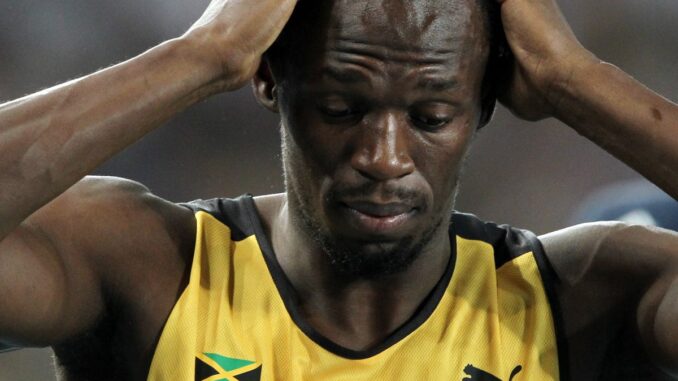
The President of World Athletics roared in the middle of the Monaco storm, announcing an unprecedented historic penalty in athletics. And Usain Bolt’s reaction afterwards shook the entire athletics world… ⚡💔
For nearly two decades, Usain Bolt’s name has stood as a symbol of human greatness — the man who defied limits, the lightning that changed sprinting forever. From Beijing 2008 to Rio 2016, his golden stride redefined speed, joy, and dominance. But in a shocking and controversial twist, the President of World Athletics stunned the sporting world in Monaco last night, declaring that Bolt’s name and records would be “temporarily suspended pending historical review.”
The announcement was made during an emergency session of the World Athletics Council as thunder rolled across the Mediterranean skies — a fitting backdrop for what many have called “the storm that shook track and field to its core.” Cameras captured the moment when the President, visibly furious, slammed his hand on the table and exclaimed, “This is the biggest betrayal in sports history!” before confirming that multiple legacy files from past Olympic and World Championship data were being “reclassified under the integrity protocol.”
Almost instantly, social media exploded. Hashtags like #StandWithBolt and #BringBackTheLightning began trending within minutes. Fans, athletes, and former officials were left speechless. What could possibly justify erasing the legacy of the man who became the face of modern athletics? Reports suggest that the review stems from a deeper dispute over data ownership, image rights, and unresolved disputes within World Athletics’ digital archives — not doping, but something even stranger: the control of sports history itself.
When news reached Bolt in Jamaica, sources say he was at a local track in Kingston, coaching young sprinters. His reaction was calm but heart-wrenching. Taking to social media later that evening, he posted a single line that broke millions of hearts:
“You can erase the records, but you can’t erase the race.”
Those words hit like thunder. Within hours, current and former athletes — from Sydney McLaughlin-Levrone to Sha’Carri Richardson and Shelly-Ann Fraser-Pryce — voiced their outrage. Olympic champions and world icons flooded timelines with the lightning emoji ⚡ in solidarity. Even rival federations demanded clarification, calling the move “a dangerous precedent” and “an attack on sporting immortality.”
In Jamaica, candlelight vigils began forming outside the National Stadium, where Bolt’s legend was born. Local news described it as “a night of sorrow and pride — sorrow for the betrayal, pride for the man who still stands tall.”
World Athletics later released a partial clarification, insisting that “no final judgment has been made” and that the situation involves “archival inconsistencies in official records.” But for fans, the damage is done. The idea that the greatest sprinter in history — the man who ran 9.58 seconds into eternity — could be erased feels like sacrilege.
Yet, as the storm in Monaco fades, one truth stands firm: Usain Bolt’s legacy doesn’t live in databases or medals. It lives in memory — in the rhythm of the crowd, in the gasp before the gun, in that golden smile after the finish line. You can challenge the records. You can question the archives.
But you can never, ever erase lightning. ⚡
Be the first to comment